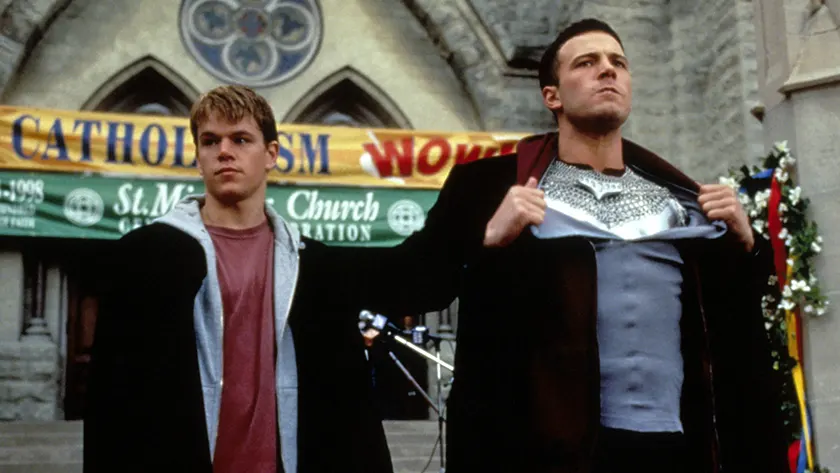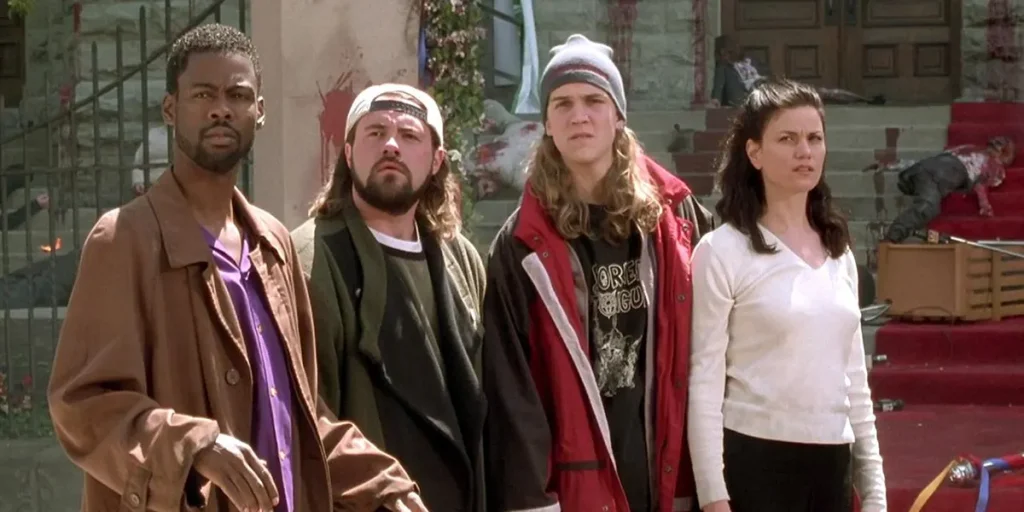Kevin Smith’s Dogma still works as an irreverent and dialogue-heavy comedy that smartly tackles religion, faith and the nature of humanity.
Writer & Director: Kevin Smith
Genre: Adventure, Comedy, Fantasy, Drama
Rated: R
Run Time: 130′
Original Release: November 12, 1999
4K Restoration Re-release: June 5, 2025
Where to Watch: In select U.S. theaters / On DVD
After being entangled in rights issues for years, Kevin Smith’s Dogma was finally bought from Miramax by Iconic Events, which has allowed the popular filmmaker to re-release the movie in cinemas for its 25th Anniversary, fully remastered so it can look as good as the day it initially came out. Thus, it feels like a good time to revisit this irreverent comedy centred on religion and faith, which takes place in the View Askewniverse that started with cult classic Clerks, and has continued to be featured in many more films written and directed by Smith.
Unlike the other movies set in said universe, though, Dogma feels like a different beast. Most of Smith’s films appear to be unique thanks to his knack for snappy dialogue and irreverent comedy, and thankfully, they also have something to say about the human condition (tackling themes usually related to sex or relationships). But for Dogma, the filmmaker instead tried to handle the topic of religion, and more specifically, organised religion. By developing a narrative that both takes and doesn’t take religion and faith seriously, he managed to craft a movie that angered and entertained people in equal measure, but that, curiously enough, doesn’t feel particularly offensive for today’s standards.
Dogma’s protagonist is Bethany (a phlegmatic Linda Fiorentino, of Men in Black), a seemingly regular woman who one day is called upon by the Voice of God (Alan Rickman, of the Harry Potter movies). He tells her he has a mission for her: she must stop a couple of Fallen Angels named Bartleby and Loki (Ben Affleck and Matt Damon, respectively) from passing through the archway in a Church in New Jersey. If they do so, they will go to Heaven despite having been barred from returning home, and thus, all existence will cease to exist. After all, God is supposed to be infallible, and if the Angels fulfil their objective, they will manage to prove God wrong.

Thankfully, in order to fulfil her destiny, Bethany has some help. She first comes across Jay (Jason Mewes) and Silent Bob (Smith), who are supposed to be her prophets. They are then joined by Rufus the Thirteenth Apostle (Chris Rock, of Rustin), who is still angry he was left out of the New Testament for being Black. And they even get the help of Serendipity (Salma Hayek, of Magic Mike’s Last Dance), who used to be a Muse, but nowadays works as a stripper. Together they must fulfil Bethany’s mission and save the world.
Through this appropriately silly narrative, Smith manages to convey many of his ideas regarding religion, its importance, and its flaws. He introduces ideas that, for the average person, might feel harmless enough, but that nowadays might anger “Anti-Woke” crusaders and the far-right and ultra-conservative population of the U.S. Thus, Dogma postulates that God is actually a woman (portrayed by Alanis Morissette, wearing a metallic shirt, a tutu-like skirt and flip-flops, and acting quite child-like), Jesus was a Black man, and the Church conspired to hide most of the story of the latter’s life from the public eye. It’s nothing that contradicts Biblical teachings, but at the same time, it feels irreverent enough that no one should be surprised people protested against the film (without having watched it, of course) back in 1999.
In the end, though, despite all these relatively wacky ideas, Dogma ends up feeling like a very religious movie. It respectfully uses God and the Angels in order to serve the narrative, and characterises the forces of Heaven as rather snarky and sometimes funny, but in general, quite benign. On the other hand, Demons are portrayed, well, as violent antagonists, and the Fallen Angels (portrayed with gusto by real-life best friends Affleck and Damon) prove to be formidable villains, especially when they reveal their Biblical outfits and extend their wings. Dogma ends up being, then, about a struggle between good and evil; between Heaven and Hell.
It’s interesting – albeit understandable, given the rest of his filmography –, then, that Smith decides to surround all the aforementioned themes and characters with sex and poop jokes and four-letter words. Dogma can be quite funny at times, letting characters such as Jay and Silent Bob react appropriately to all the over-the-top stuff taking place around them, and even letting Chris Rock loose, allowing him to portray Rufus as someone who’s been around for a long time, and thus refers to historical and Biblical events rather casually. Additionally, the movie includes a poop demon, a character’s head exploding, Jay being obsessed with having sex with Bethany, and of course, Buddy Christ. The latter is the Church’s latest attempt to appear “hip” and “cool”, and has transcended the movie itself, becoming a sort of icon or representation of what Dogma is.
Which is all well and good, because the film is more dedicated to criticising the Church as an institution and its very obvious flaws, rather than faith or belief. Smith is not mocking believers or deeply religious people; he uses his characters to comment on the Church’s outdated views, and on the way supposedly spiritual people can be cruel or illogical. Characters such as Rufus even mention that having so many contradictory religions at the same time is a mistake, and even goes against God’s plan. Institutionalising everything contradicts the whole point of faith, which is something Smith apparently deeply believes in.
Now, all the performances in Dogma are quite strong, except for one. I don’t think Linda Fiorentino is a bad actress, but she is terribly miscast as Bethany. She plays her lethargically, without personality or charm, making it difficult for the viewer to connect with her. It obviously doesn’t help that Smith doesn’t seem to have a clear idea of what kind of person she is, but someone more attuned to his style could have done something more interesting with the character. Fiorentino is not awful, but she’s at least boring, especially compared to her co-stars. Mewes and Smith are great as always as the iconic duo of Jay and Silent Bob; Alan Rickman is completely credible as the Voice of God; Chris Rock is hilarious as Rufus, and Affleck and Damon seem to be having tons of fun playing a couple of frustrated and aggressive Fallen Angels.
Dogma is not a subtle movie. It conveys most of its themes through expository dialogue, sometimes interrupting the action in order to allow its characters to have conversation after conversation. Moreover, the movie is not precisely a visual wonder; Smith has always admitted he’s not a very gifted director, which is obvious in Dogma, with its stiff camerawork, basic shot-reverse-shot scene design, and sometimes confounding editing choices (most of the wipe transitions look amateurish at best). But despite all those flaws, Dogma still manages to captivate thanks to its mix of juvenile humour, interesting commentary on organised religion and faith, and snappy dialogue. Dogma was a joy to watch for its 25th Anniversary; I just hope this new re-release will allow it to find a new audience, especially now that there’s pretty much no controversy surrounding the film.
Dogma: Movie Plot & Recap
Synopsis:
A seemingly normal woman gets called by the Voice of God to stop a couple of Fallen Angels from entering a Church, going back to Heaven and thus, destroying the whole of existence.
Pros:
- Still pretty funny.
- Performances are great (except for one).
- Thematically interesting.
- Some snappy dialogue.
Cons:
- Amateurishly directed.
- Some weird editing choices.
- Dialogue can be heavy-handed.
Dogma will be re-released in a new 4k restoration in 1500 theaters across the U.S on June 5, 2025, after a screening at the Cannes Film Festival on May 23. The original version of the film is also available to buy on DVD.

